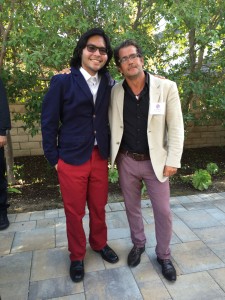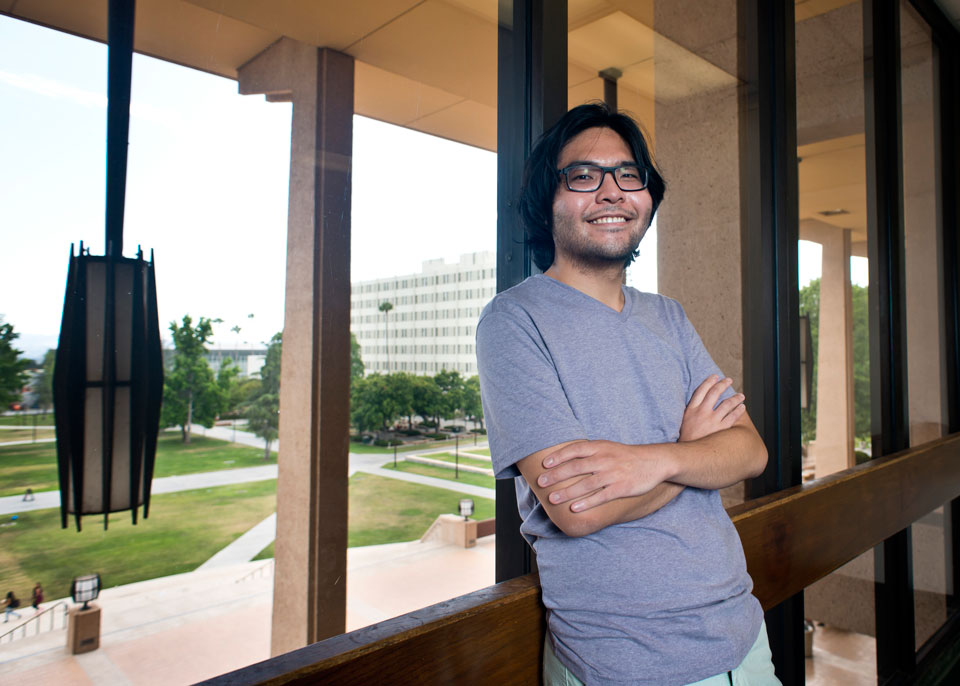From Hardship to Achievement – CSUN Student Receives CSUN’s Highest Honor

Tyler Pugeda (L) and his faculty advisor, Abel Franco (R), work closely on Pugeda’s research project. Photo courtesy of Tyler Pugeda.
A tired middle school student gets home from class, enters the front door and throws down his backpack in the corner of the living room. Exhausted from his reading and writing classes, he turns on the Nintendo 64, spending the next couple of hours playing Paper Mario until dinner time.
The next day at school, he copies his homework from a friend and pretends he’s read the chapters of the book in his English class, which he hasn’t. Tyler Pugeda didn’t see a purpose in education — particularly not in getting a college education.
Years later, Pugeda is now attending California State University, Northridge, maintaining a GPA above 3.75 as a double major in mathematics and philosophy. He belongs to CSUN’s Deaf and hard-of-hearing community and is involved in numerous CSUN clubs, such as the Deaf CSUNians, the College Bowl and the philosophy club, where he recently was elected club president. To recognize Pugeda’s thriving academic achievements, he was awarded CSUN’s most prestigious scholarship, the President’s Scholarship.
“It is a tremendous honor for me to get selected as the presidential scholar,” said Pugeda. “I didn’t expect it at all.”
The Presidential Scholarship will help Pugeda pay for college expenses while working on a yearlong project with faculty mentor and philosophy professor Abel Franco. His project will focus on French philosopher and mathematician René Descartes and his views on the human mind.
“I’m currently researching Descartes’s view on perfection in his theory of mind, such as sensations, passions and knowledge in order to better understand what he means by ‘perfection,”‘ Pugeda said.
Franco, his faculty mentor, said he is fascinated by Pugeda’s work ethic, determination and strong will.
“What happens often is when people see a student with a certain disadvantage, they compensate by bringing the standards to a lower level,” he said. “But I don’t need to do this for him. He is one of the best students I’ve ever had.”
Franco said he is particularly proud of Pugeda because his project was the only one selected in the field of humanities — all other projects are in science, technology, engineering and math fields.
“This is a good opportunity to prove that philosophy can be in there — and that a deaf person can be in there,” said Franco. “We can expect just as much as we can expect from everybody else.”
Pugeda struggled through elementary and middle school to keep up with his peers in acquiring reading and writing skills. Their family physician advised his parents to keep him from learning American Sign Language (ASL) because he argued that mistakenly, it would hinder Pugeda’s speech development. Because of this, the years to come in elementary and middle school would become a living nightmare for Pugeda.
“I didn’t know what to do,” he said. “I didn’t know how to think and just followed what the teachers told me to do. I never had the opportunity to develop my own view, and I was scared that people would see me as intellectually inferior because of my deafness.”
Toward the end of middle school, he started to become more familiar with ASL and began to study how to express himself in sign language, which turned out to be a significant life changer.
“When I finally started to learn ASL in middle school, my language skills bloomed,” he said. “ASL gave me full access to everything and for the first time, I fully understood what was going on around me.”
Yet, Pugeda’s deafness required him to grow a thick skin, he said. Even though his high school provided sign language interpreters, Pugeda still lagged on writing skills and was intimidated by teachers and classmates, he said.
“Many people underestimated me because of my background,” he said. “Some teachers didn’t have confidence in me — they saw only me as a student with special needs, who needed constant help.”
Pugeda proved them wrong. He spent an entire summer reading more than 30 books and studied vocabulary, grammar and critical reading. During his senior year in high school, he earned straight-A’s and was accepted to a college in New York, which offered him three scholarships worth $30,000.
“I worked hard to earn the privilege of studying in college,” he said. “I’m the only deaf student from my high school class to have attended a four-year university.”
Even though Pugeda received acceptance letters from several other four-year universities, he decided to attend CSUN.
“I believe that attending a college that’s right for you should challenge you to grow as a scholar,” he said. “The right college should provide outstanding resources for you to figure out what you want to do.”
Pugeda said he chose CSUN because he felt an instant connection to the campus through the Deaf CSUNians, a leadership organization for the Deaf and hard-of-hearing community on campus, and the National Center on Deafness (NCOD), where he ended up tutoring in math and writing for three years.
“In my whole life, I have seen how Deaf people are denied many opportunities to advance their careers or education just because of their deafness,” he said. “CSUN is the first college in the United States to provide access services for the deaf and hard of hearing, and their policy has influenced other colleges to do the same.”
Student development specialist Matthew Reinig has worked with Pugeda at the NCOD and served as advisor for Deaf CSUNians during Pugeda’s presidency in 2015. Reinig said Pugeda is a role model to other CSUN students — not only the Deaf and hard of hearing.
“He knows that in order to achieve what he wants in life, he must be involved with the very activities that foster his personal and professional growth,” Reinig said. “It isn’t given to him, but rather he takes advantage of what exists. He has developed an understanding of the process of success, and he accepts that it isn’t easy.”
After graduating from CSUN, Pugeda said he hopes to attend Harvard University, New York University, Rutgers University or another program, to obtain a Ph.D. in philosophy. He’s aware of the competitive nature of these programs, and he is already studying for the Graduate Record Examination (GRE).
“I know what I need to do to get into a top program, so that’s what I am working on right now,” he said. “My goal is to be above the 90th percentile so they’ll read my statements. My application will show my motivation, if they take the time to read it.”
Pugeda researched multiple Ph.D. programs across the country.
“I don’t aim to attend those universities for their prestige, but because I aspire to work with leading philosophers in my areas of interest,” Pugeda said. “It is competitive to get in, but you should never let your challenges shape your destiny.”


 experience
experience